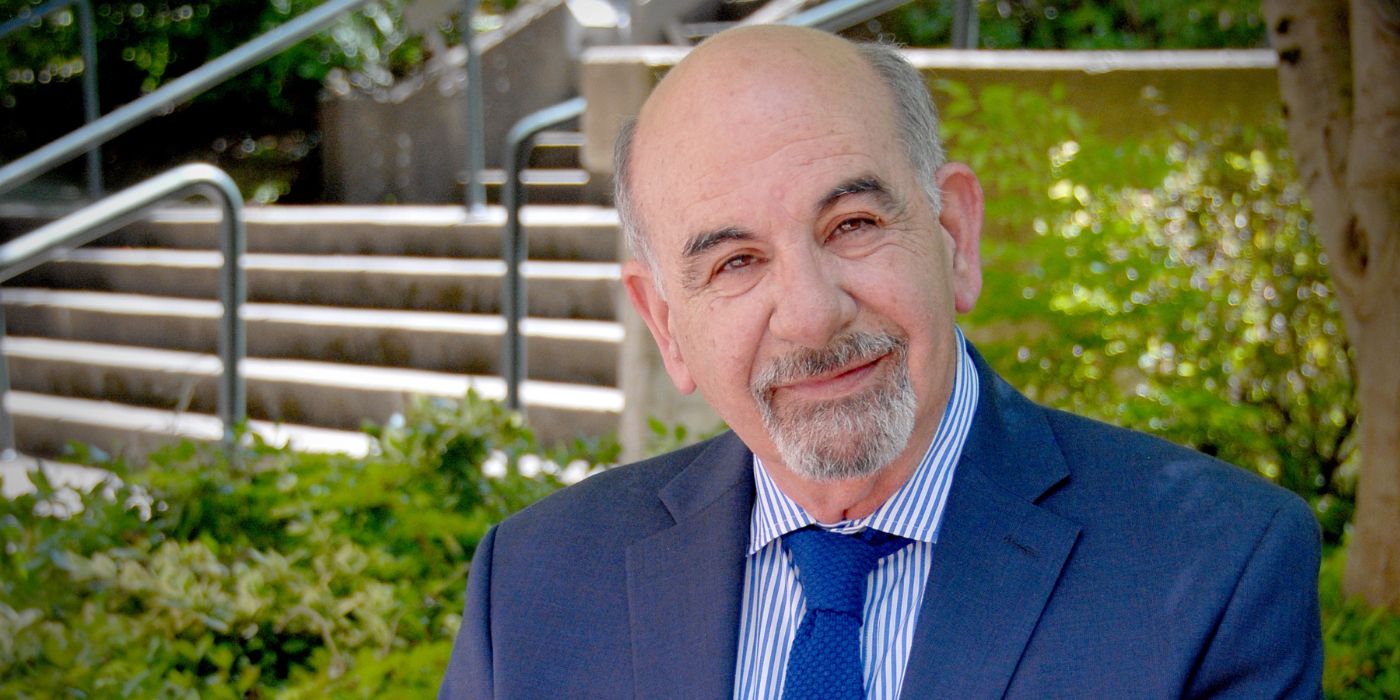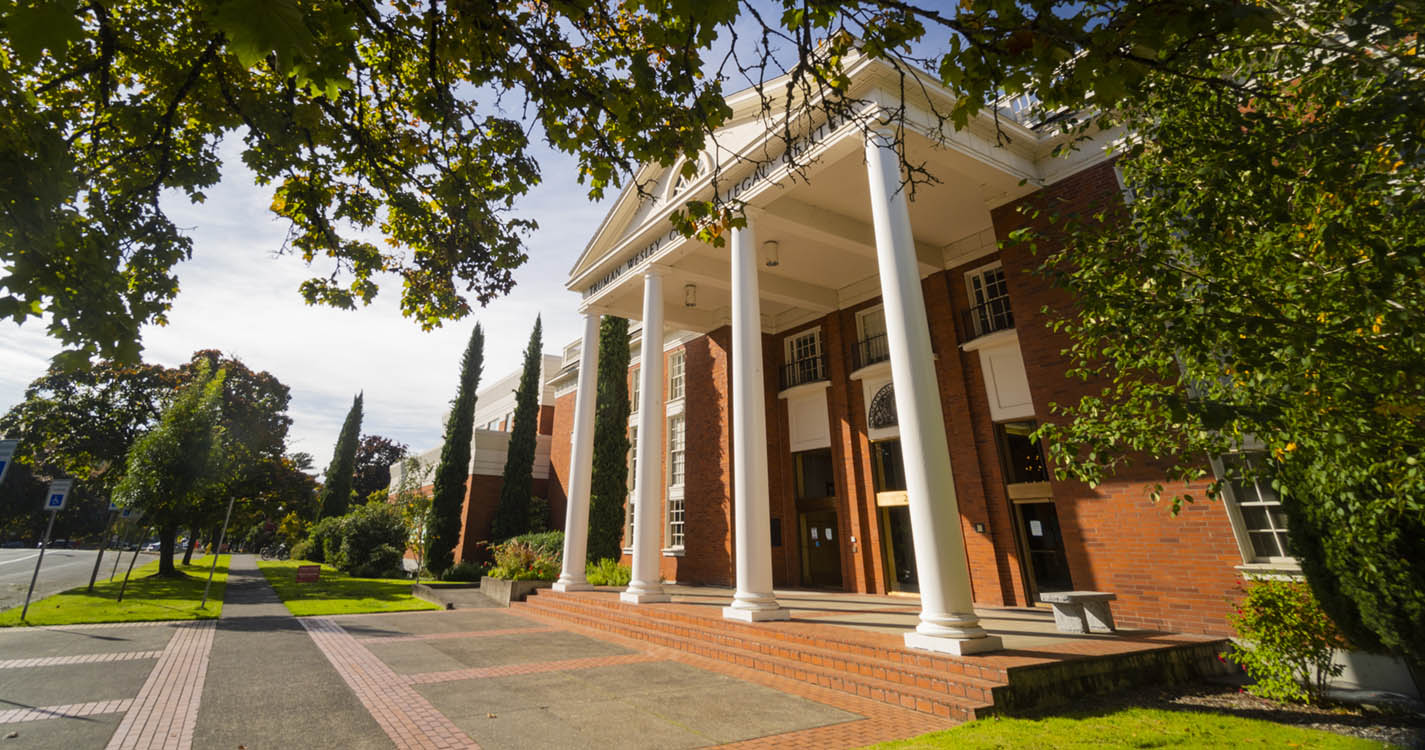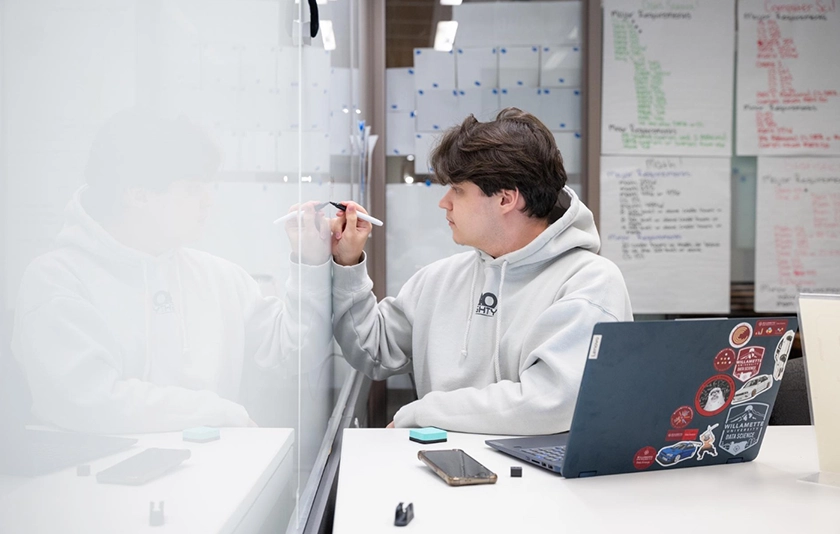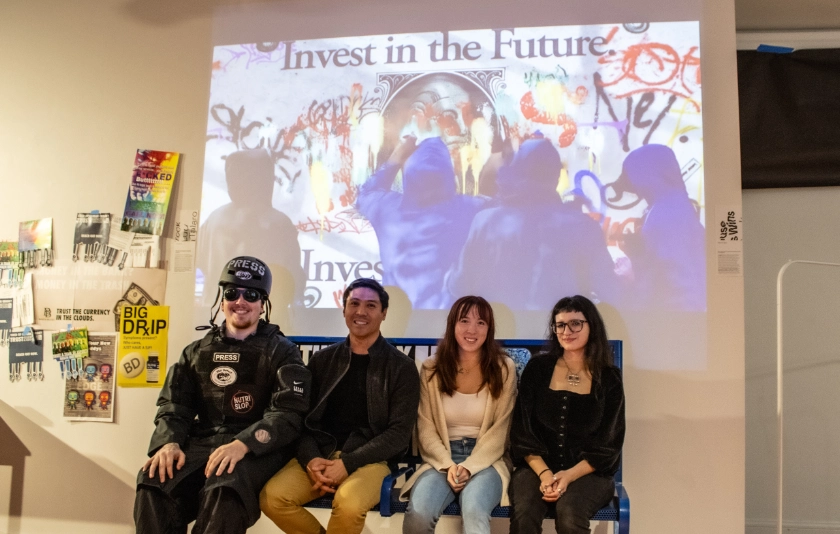The affectionate phrase, “If you know Symeon…,” echoed throughout the day during a special SYMposium in honor of Professor and Dean Emeritus Symeon Symeonides held this spring.
Appreciative murmurs of agreement, laughter and shared memorable moments punctuated the event as fellow professors, alumni, friends and colleagues gathered to celebrate the man who has been called “the conflicts giant,” “the world’s leading expert on U.S. and comparative conflicts law,” and “the father of choice of law in the 21st century.”
“While so many of his efforts have had broad reaching impact locally, nationally, and internationally, Symeon’s impact can also be felt on a personal level by students, faculty, staff, and myself,” said former Willamette Law Dean Brian Gallini at the symposium. “He is rightfully known for the individual care and concern he offers to students, making himself available to answer questions both small and large.”
After 50 years laboring in the “conflicts vineyard,” Symeonides will hang up his hat — though he doesn’t plan to give up his pen — when he retires from teaching in 2025.
With all the praise and accolades, one might presume Symeonides to be lofty or unreachable. But the long list of admirers taking part in the symposium said otherwise.
“He’s humble, he’s self-possessed, he’s kind, he’s gentle,” said Judge John DeGravelles, U.S. District Judge for the Middle District of Louisiana.
“In meetings, he never took over the room, but patiently listened to every voice,” said David Kenagy, former Willamette Law associate dean. “In the strict linguistic sense, he was both leader and servant.”
“If you know Symeon, you know it is his custom in life to stop whatever he is doing and to take the time to see others … and try to find a way to serve and uplift them,” said Warren Binford, former Willamette Law professor. “Students first, faculty second, himself last.”
It seemed the symposium participants could have continued their monologues much longer than the time provided, which seemed an appropriate, and yet likely still inadequate, way to show their esteem for the man who has written over 100 articles, including 30 years of annual surveys on conflicts law, and more than 30 books.
Professors from around the world and from prominent U.S. universities, such as Harvard, Yale, Pennsylvania, NYU and Michigan, lauded Symeonides’ contributions to the field as invaluable. Their papers will be published in a special issue of the Willamette Law Review, together with 30 other papers from foreign professors who could not be present at the event.
One of the speakers, Professor Kermit Roosevelt III, who is the chief reporter of the Restatement (Third) of Conflict of Laws, acknowledged that the rules that Symeonides distilled from thousands of judicial decisions “are essentially what the [Third] Restatement adopted,” concluding: “I thank Symeon for teaching them to me.”
When asked if he is proud of the accolades, Symeonides responds:
“I am gratified in realizing that I have earned the genuine affection of my peers, which, in the academic world, cannot be taken for granted,” Symeonides says. “It is nice to be respected for your scholarship, but even nicer to be both respected and loved. At least, that’s how I felt during the symposium.”
Planting seeds
Symeonides was born and raised in Lythrodontas, Cyprus, which was then a British colony. He was the seventh child of a poor farmer who, as the head of a farmers’ union, spoke against the British and was imprisoned for three years when Symeonides was six years old.
“This adversity taught me early on that life is not about what you want to do,” Symeonides says, “but rather, what you must do.”
That lesson, along with a near-death experience when a mortar shell landed next to him as a young soldier defending Cyprus from the Turkish invasion, shaped Symeonides’ life and personality.
He says he was lucky to receive scholarships to study law in Greece and at Harvard — education he could not have otherwise afforded. His extensive legal studies and great mentors helped him become “legally bilingual,” able to explain American law to Europeans and European law to Americans.
After teaching at the University of Thessaloniki Law School, where he earned his first law degree, he spent two decades in Louisiana at the LSU Law Center, culminating in a seven-year service as vice chancellor. He attributes part of his success to “the immigrant syndrome, which forces you to work twice as hard to prove that you deserve to be included,” and partly, to luck.
“I was at the right place, at the right time, to be asked to codify the state’s conflicts law,” Symeonides says. “This was the first codification ever attempted on American soil, and, more than three decades later, it is regarded as a model for a nationwide codification,” he says.
Tending the vines at Willamette Law
In 1999, Symeonides joined Willamette Law as dean, serving in that capacity until 2011. In a world where the average tenure of a law school dean is a little more than three years, Interim Dean Jeff Dobbins remarked during the symposium that “you can’t be dean for 12 years without being good at what you do.”
Throughout his deanship, Symeonides had an open door and time, it seemed, for everyone.
“He always made it a point to serve as a mentor to junior scholars,” Dobbins said. “Whether by pointing your brain in a different direction, helping brainstorm ideas, reading drafts or just offering his perspective. He has always made us feel when we knock that he’s been waiting for you.”
Yet, Symeonides had work to do. His annual surveys on conflicts law required the collection of up to 6,000 American conflicts-of-law cases per year and 15-17 hours spent reading and summarizing each day for a couple of months. And then there were his regular tasks as dean — speaking with prospective students, teaching, fundraising, promoting camaraderie with the faculty — the list went on.
Former research assistant Olivia Courogen JD’22 said during the symposium that Symeonides played a significant role in her decision to attend Willamette. During a visit to the school, she met him, introduced herself and asked if he would eat lunch with her family.
“He sat with my parents and I for over an hour,” she said. “He talked about the school, his career and answered all of my questions about Willamette … That one conversation became a measuring stick for me [and what I compared every visit to]. ‘Is there an interaction I can have at another law school that’s going to be as valuable and exciting to me as that was?’”
Mike Bennett BA’70, former associate vice president for advancement, was the major gifts officer for Willamette Law when Symeonides was dean.
“He was a development officer’s dream,” Bennett said. “He’s unique and very special. His humility and drive for excellence paid real dividends for major gifts for the law school. He made me look good, but I knew the truth — it was Symeon.”
Although he stepped down as dean in 2011, Symeonides has remained at Willamette Law, continuing to teach and produce scholarly work.
A bountiful harvest
At the symposium, Kenagy, the former associate dean for academic affairs, summed up Symeonides’ toil as a “vine tender” over the last 50 years, 25 of which were at Willamette Law. A vineyard has rows of perfectly organized grape plants, he said, with a structure and design that produces the prized wine.
“I assume no one here can miss the connection in this grand metaphor in a vineyard to that part of Symeon’s massive scholarly work that you all refer to as the survey,” Kenagy said. “For a few of the years he worked on the survey, I witnessed the light streaming under his doorway after a long day teaching.
“The ‘plant stock’ had to be chosen from thousands of cases. Only the most productive and useful had to be planted, organized, trimmed, watered and tended, for all to see and use. That’s the vineyard I am picturing. The conflicts vineyard provides ready fruit for use … That visionary thinking in turn fills the bottle of wine of scholarly choice of law decisions.”
And Binford, the former professor, shared a similar sentiment:
“Some people assume his publications are the fruit of the vine. I have watched the countless students he has taught, the faculty he has cultivated, and the emerging scholars he has mentored,” she said. “As impressive as the body of work he has written, look at the lives he has cared for, strengthened, uplifted and helped to grow through 50 years of quiet mental deliberative interweaving, the bounty harvest that would make Dionysus drunk with envy.”
Courogen has kept in touch with Symeonides since her graduation, informing him when there is important news in her life.
“He would say, ‘Bravo, Olivia,’” she said at the symposium. “Now it’s my turn. Bravo, Professor Symeonides.”
At the end of the symposium, amidst cheers and well wishes, glasses were raised as Bennett, and others, honored Symeonides.
“A toast to this fine man.”




